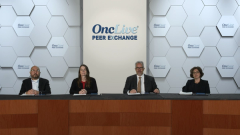
Unmet Needs and Potential Advances in MPN and MF
A group of experts share unmet needs in the treatment of MPN and MF while providing information about potential advances that could impact treatment in the future.
Episodes in this series

Ruben Mesa, MD: Let’s pivot in terms of new therapies and some of the unmet needs. We’re mindful from this year [2021] at the American Society of Hematology [ASH annual meeting], a range of additional mechanisms of action that are being looked at. We’ve discussed several, we’ve discussed several different JAK inhibitors, BCL-XL, we discussed BET inhibition, there are a few others. Now there’s a range of unmet needs that we have out there.
Why don’t you guys share, and I’ll call on each of you, something that you feel in terms of an unmet need, but also what are the other kinds of novel mechanisms of action out there, what drug is being tested, what do you think about it at this point? Angela, we’ll let you go first. There are a few, so you get to pick which one you’re excited about.
Angela Fleischman, MD, PhD: I think that with myelofibrosis [MF] we’re targeting different things. One area of interest is the fibrosis itself. We really do need to clarify, honestly, in terms of the pathogenesis of the disease, why is fibrosis important? Is it a consequence, or what features of the disease is the fibrosis driving? That’s why I think that narrowing down agents, such as this AVID200, where we’re focusing on fibrosis [is important]. Not necessarily that agents that would focus on fibrosis would be single agents, but they may reveal the true importance of fibrosis in the disease. What is it important for, and what is it maybe not important for? I thought that was interesting.
Ruben Mesa, MD: That’s an interesting trial, a shameless plug for our MPN Research Consortium, but looking at that interesting agent AVID200 in a difficult group of patients. It’s an ongoing study, but we’re learning more, and a very interesting mechanism. Jamile, what about yourself? A therapy discussed at this year’s ASH, a non-JAK inhibitor, why might we consider it? Any preliminary thoughts on its activity?
Jamile Shammo, MD, FACP, FASCP: I was looking at imetelstat, only because of some experience with patients with MDS [myelodysplastic syndrome], and they’re coming off transfusions with the agent. Now, we’re looking at the IMpactMF trial, which is the phase 3 trial. This is an IV [intravenous] infusion once every 3 weeks versus best available therapies, excluding JAK inhibitors. So now perhaps, we can see if we will have an alternate treatment option for those who have failed all JAK inhibitor therapies. That I think is important.
Ruben Mesa, MD: Very interesting. It’s clearly a drug active in ET [essential thrombocythemia] and MF, as it has been reported. It’s very interesting looking at survival as an end point in that study. The depth of responses in the spleen and the symptoms are modest, yet a suggestion of a survival benefit. And certainly, acknowledging that there well may be other mechanisms by which people live longer, might call out in my mind, might they still benefit from some sort of combination? Because again, might you improve some of those phenotypic parts but improve survival? It’s a very important study. Stephen, how about yourself? There are several things out there. I’m excited just by how deep the pipeline is for MF.
Stephen Oh, MD, PhD: I think this continues to be a really exciting and encouraging time in the field to see so many agents that are in development, that are being tested, that have preliminary evidence of efficacy. In particular in the last few years, we’re getting the sense that there are multiple agents that are moving forward that ultimately, we hope to see approved and have use in different settings for patients with myelofibrosis. I will say on the other hand, that a few of these newer agents that were just presented at ASH, I found the results to be not particularly impressive, and concerning to a certain extent for the toxicity. Some of these agents, I’m not particularly enthusiastic about. For instance, selinexor, I don’t see that as a very appealing agent in development.
I would echo that the AVID200 is intriguing. In particular, although overall efficacy was limited in what was presented, this indication of improved platelet counts with AVID200 was intriguing. Then imetelstat, again as mentioned, this potential for prolonged survival, which is something that we don’t typically even discuss, because it’s not something we’ve been seeing for many of the studies we’ve been looking at.
Ruben Mesa, MD: I’m impressed by the robustness of the pipeline, but I’m also mindful we need to be cautious with phase 2 data in limited patients to jump ahead too far. We certainly have had many historical end points that we have prioritized: spleen, symptoms, anemia, a bit because we lack an adequate understanding of some other surrogate markers to see how they impact the patient.
There’s a lot of discussion in our field now about disease modification. I pontificate a bit that patients, they can live longer, they can live better, or they can have both, and that everything else, maybe is a surrogate that gets tied to that. Is that fibrosis? Is that allele burden? Is that karyotypic changes? All of those things might be nice, even progression-free survival, but it really only factors in as longer, better, or both. But I’m deeply grateful that there’s a tremendous amount of energy, there are a lot of smart scientists working together. I sometimes fear that we might jump over a drug that might have some good impact, it’s tested just in the wrong setting. Single agent, second line might be helpful, or it might just be the wrong setting. So we always should be mindful that we do not scrap anything too quickly.
This transcript has been edited for clarity.




































